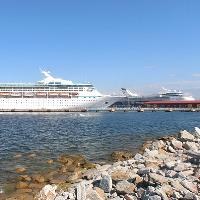(BRUSSELS) – Safety rules for passenger ships in EU waters are to be tightened up, after the European Commission adopted a number of proposals including making best use of recent technological developments.
Some 400 million passengers on average travel every year in EU waters. The Commission says the update is a response to lessons learnt, including from accidents.
“Offering the highest safety standards to passengers across all transport modes is one of my top priorities,” said Transport Commissioner Violeta Bulc. “The update we are proposing aims to enhance safety by clarifying the rules and by making the best use of recent technological developments. We also propose to remove some redundant and costly requirements.”
These are the key changes to the safety standards and requirements for passenger ships sailing in EU waters:
The proposal amending Directive 98/41/EC on registration of persons on board introduces a requirement to register passenger data in a digital manner, using harmonised administrative procedures (the so-called National Single Window established under Directive 2010/65/EU).
Currently data concerning persons on board is kept by the companies’ registrar. The proposal also introduces flexibility for operators on shorter voyages.
The proposal amending Directive 2009/45/EC on technical requirements for passenger ships on domestic voyages clarifies that ships built in aluminium have to be certified according to this Directive and meet its fire safety requirements. It is also proposed to exclude ships below 24 metres from the scope of the Directive, for which its prescriptive standards proved to be difficult to adapt in practice. National rules for such ships can generally take better account of local circumstances.
The proposal replacing and repealing Directive 1999/35/EC on surveys for ships in regular service aims to eliminate overlaps between various inspection regimes. This, says the Commission, will preserve the safety level while reducing the administrative burden on shipowners and rationalise the inspection efforts of Member States’ authorities.
Next steps:
In the coming months, while the EU co-legislators discuss these proposals, the Commission says it will follow up on the remaining recommendations of the fitness check. These relate primarily to increasing the level of survivability of passenger ships in damaged condition at international level and developing a set of new, goal based standards for small passenger ships built from innovative materials such as fibre-reinforced plastic.


